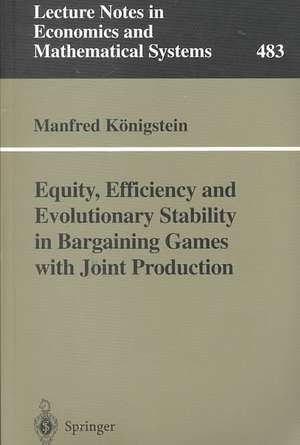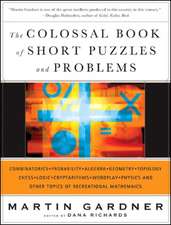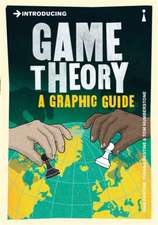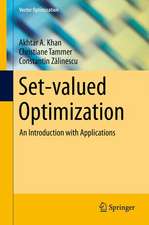Equity, Efficiency and Evolutionary Stability in Bargaining Games with Joint Production: Lecture Notes in Economics and Mathematical Systems, cartea 483
Autor Manfred Königsteinen Limba Engleză Paperback – 6 mar 2000
Din seria Lecture Notes in Economics and Mathematical Systems
-
 Preț: 360.02 lei
Preț: 360.02 lei -
 Preț: 383.93 lei
Preț: 383.93 lei - 15%
 Preț: 693.39 lei
Preț: 693.39 lei -
 Preț: 384.09 lei
Preț: 384.09 lei -
 Preț: 380.07 lei
Preț: 380.07 lei -
 Preț: 446.26 lei
Preț: 446.26 lei -
 Preț: 497.37 lei
Preț: 497.37 lei -
 Preț: 380.84 lei
Preț: 380.84 lei -
 Preț: 384.86 lei
Preț: 384.86 lei -
 Preț: 378.34 lei
Preț: 378.34 lei -
 Preț: 399.67 lei
Preț: 399.67 lei - 20%
 Preț: 360.93 lei
Preț: 360.93 lei - 15%
 Preț: 643.16 lei
Preț: 643.16 lei -
 Preț: 379.09 lei
Preț: 379.09 lei -
 Preț: 404.76 lei
Preț: 404.76 lei -
 Preț: 385.62 lei
Preț: 385.62 lei - 15%
 Preț: 644.49 lei
Preț: 644.49 lei -
 Preț: 379.09 lei
Preț: 379.09 lei -
 Preț: 345.50 lei
Preț: 345.50 lei -
 Preț: 425.80 lei
Preț: 425.80 lei -
 Preț: 378.34 lei
Preț: 378.34 lei - 18%
 Preț: 775.65 lei
Preț: 775.65 lei -
 Preț: 392.60 lei
Preț: 392.60 lei -
 Preț: 401.61 lei
Preț: 401.61 lei - 15%
 Preț: 646.43 lei
Preț: 646.43 lei -
 Preț: 382.18 lei
Preț: 382.18 lei -
 Preț: 378.34 lei
Preț: 378.34 lei - 15%
 Preț: 637.59 lei
Preț: 637.59 lei - 15%
 Preț: 647.27 lei
Preț: 647.27 lei -
 Preț: 377.73 lei
Preț: 377.73 lei -
 Preț: 447.84 lei
Preț: 447.84 lei - 15%
 Preț: 644.49 lei
Preț: 644.49 lei -
 Preț: 386.00 lei
Preț: 386.00 lei - 15%
 Preț: 654.43 lei
Preț: 654.43 lei -
 Preț: 415.02 lei
Preț: 415.02 lei -
 Preț: 411.54 lei
Preț: 411.54 lei -
 Preț: 398.92 lei
Preț: 398.92 lei -
 Preț: 398.92 lei
Preț: 398.92 lei -
 Preț: 392.75 lei
Preț: 392.75 lei - 15%
 Preț: 635.47 lei
Preț: 635.47 lei - 20%
 Preț: 653.56 lei
Preț: 653.56 lei -
 Preț: 379.86 lei
Preț: 379.86 lei -
 Preț: 495.46 lei
Preț: 495.46 lei -
 Preț: 447.99 lei
Preț: 447.99 lei -
 Preț: 378.71 lei
Preț: 378.71 lei - 15%
 Preț: 637.13 lei
Preț: 637.13 lei -
 Preț: 385.84 lei
Preț: 385.84 lei -
 Preț: 378.54 lei
Preț: 378.54 lei - 15%
 Preț: 666.55 lei
Preț: 666.55 lei
Preț: 383.50 lei
Nou
Puncte Express: 575
Preț estimativ în valută:
73.39€ • 78.47$ • 61.19£
73.39€ • 78.47$ • 61.19£
Carte tipărită la comandă
Livrare economică 18 aprilie-02 mai
Preluare comenzi: 021 569.72.76
Specificații
ISBN-13: 9783540669555
ISBN-10: 3540669558
Pagini: 216
Ilustrații: XII, 197 p.
Dimensiuni: 155 x 235 x 11 mm
Greutate: 0.31 kg
Ediția:Softcover reprint of the original 1st ed. 2000
Editura: Springer Berlin, Heidelberg
Colecția Springer
Seria Lecture Notes in Economics and Mathematical Systems
Locul publicării:Berlin, Heidelberg, Germany
ISBN-10: 3540669558
Pagini: 216
Ilustrații: XII, 197 p.
Dimensiuni: 155 x 235 x 11 mm
Greutate: 0.31 kg
Ediția:Softcover reprint of the original 1st ed. 2000
Editura: Springer Berlin, Heidelberg
Colecția Springer
Seria Lecture Notes in Economics and Mathematical Systems
Locul publicării:Berlin, Heidelberg, Germany
Public țintă
ResearchCuprins
An Overview.- 1. Profit Sharing in an Asymmetric Bargaining Game.- 1.1 Introduction.- 1.2 Ultimatum Bargaining with Advance Production.- 1.3 Experimental Procedures.- 1.4 Description of the Decision Data.- 1.5 Aggregate Demand Behavior.- 1.6 Individual Demand Behavior.- 1.7 Summary.- 2. Measuring Treatment-Effects in Experimental Cross-Sectional Time Series.- 2.1 Introduction.- 2.2 Experimental Data, Repeated Measurement and Strategic Interaction.- 2.3 Fixed Effects, Identifying Restrictions and Interpretation.- 2.4 Estimation Procedures.- 2.5 Summary.- 3. Convergence to Equitable Play in the Repeated Ultimatum Game with Advance Production.- 3.1 Introduction.- 3.2 Repeated Bargaining with Advance Production.- 3.3 Theoretical Analysis.- 3.4 Experimental Procedures.- 3.5 Considerations of Experimental Design.- 3.6 Descriptive Statistics of Base Game Decisions.- 3.7 Explanatory Power of Single Predictors.- 3.8 Joint Predictions and Convergence to Equitable Play.- 3.9 Summary.- 4. Equity Anchoring in Simple Bargaining Games with Production.- 4.1 Introduction.- 4.2 Bargaining with Advance Production.- 4.3 Experimental Procedures.- 4.4 Empirical Distributions of Production and Bargaining Decisions.- 4.5 Explaining Aggregate Behavior by a Single Equity Standard.- 4.6 Equity Anchoring and the Tactical Bargaining Margin.- 4.7 Summary.- 5. Efficiency and Evolution of Social Preferences and Prosocial behavior.- 5.1 Introduction.- 5.2 Ultimatum Bargaining with Subsequent Social Production.- 5.3 Game Theoretic Solution.- 5.4 The Indirect Evolutionary Game.- 5.5 Solution of the Indirect Evolutionary Game.- 5.6 Summary.- A. Experimental Instructions Chapter 1.- B. Experimental Instructions Chapter 3.- C. Experimental Instructions Chapter 4.- D. Mathematical Supplement To Chapter 5.- D.2 Mutations ? < ? are Non-Improving if Candidate ? Supports Efficiency.- D.3 Technology 2. a.- D.4 Technology 2. b.- D.5 Technology 2.C.1.- D.6 Technology 2.C.2.- D.7 Technology 2. d.- References.
Caracteristici
Includes supplementary material: sn.pub/extras















